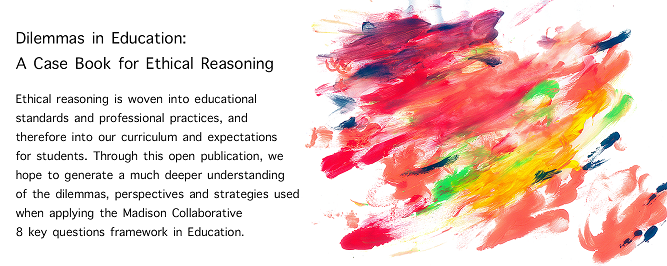
Call for Ethical Dilemmas in Education Case Studies
This work is supported by the James Madison University Program of Grants for Faculty Assistance.
Ethical reasoning is an important part of the Education profession. As such, JMU College of Education faculty are positioned to generate quality scholarship in this area. This project aims to draw on the collective experiences and literature reviews of faculty in our College, and their school and community partners, to develop a representative case study guidebook titled, Dilemmas in Education: A Casebook for Ethical Reasoning. This will be published in the JMU Scholarly Commons for the purpose of developing a deeper understanding of the dilemmas, perspectives and strategies used to apply the Madison Collaborative 8 key questions framework in Education (see http://www.jmu.edu/mc/8-key-questions.shtml). For more detailed discussion of each aspect of the framework visit the 8 Key Questions Handbook at http://www.jmu.edu/mc/Docs/131101%208KQ%20Handout%20Revision.pdf .
Faculty will use the cases in this new book to generate student discussions.
GUIDELINES
Authors are asked to submit original case studies for consideration for this book, using APA style formatting. Each case should provide a full, albeit brief description of the key aspects of the case (who, what, when, where, why) highlighting an ethical dilemma the author has encountered in his or her own practice or research. The case may be drawn from any area of professional interest and should reflect real-world experiences that may be used by College of Education faculty who wish to engage their students in the ethical decision-making process. Authors should keep confidential, any identifiable case information such that reference to any individual or organization may not be identified or inferred by the reader. In developing submissions (you may submit more than one), authors are encouraged to refer to the ethical standards for their own respective professional associations as well as the Madison Collaborative 8 key questions framework.
Include the following with each case submission:
- Case Title
- Case Keywords (3-5)
- Case Level: PK-5, 6-8, 9-12, Higher Education, Adult Education (excluding Higher Education)
- Topics: Adult Education, Art, Dance, Diversity, Early Childhood, Foreign Language, Gifted, Leadership, Elementary Education, English, History, Human Resource Development, Mathematics, Middle Education, Military, Music, Physical Education, Reading, Science, Special Education, Technology, Theatre, Other
- Abstract (50-75 words)
- Case Description and Dilemma (1,000-1,500 words)
- References (optional)
- Ethical considerations* (max. 300 words)
- Instructor insights** (max. 300 words)
- Indicate which Madison Collaborative Eight Key Questions in ethical reasoning apply.
* The Ethical considerations section should contain 3 to 5 analyses and discussion questions that provide readers of the case an opportunity to learn from the case experience and actively engage in meaningful classroom discussion regarding the pertinent ethical issues.
** The Instructor insights section should contain tips the author has for colleagues who will introduce the case into their own classrooms in order to generate discussion.
AUTHOR NOTES
Submissions from all COE faculty and COE affiliated departments and organizations, including but not limited to affiliates in school divisions and internship sites, are encouraged. Authors may submit multiple case studies for consideration. Submissions will be subjected to blind peer-review based upon a rubric to be provided to authors. Authors are advised to draft and save submissions in a word processor then copy that information into the web form when submitting. Authors are responsible for maintaining a backup of their own work.
JMU SCHOLARLY COMMONS
Please direct all questions about the JMU Scholarly Commons including but not limited to those regarding the non-exclusive distribution license for submissions to JMU Digital Collections, at lib-digitalcollections@jmu.edu. A general description of JMU Scholarly Commons can be found in the Frequently Asked Questions.


